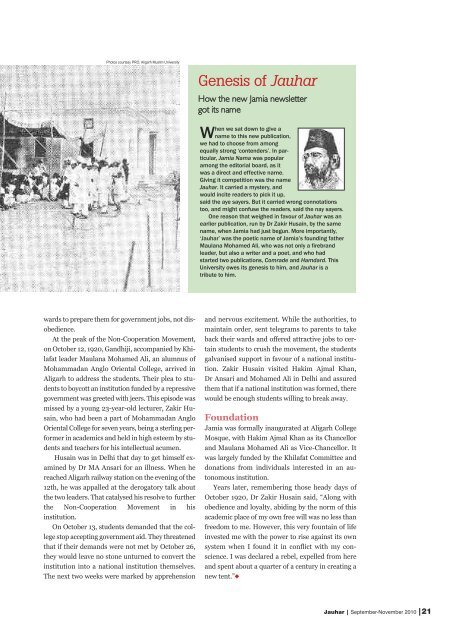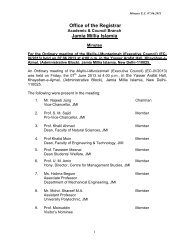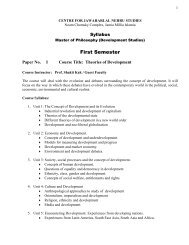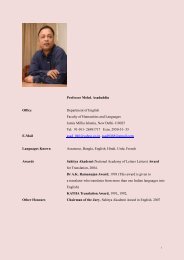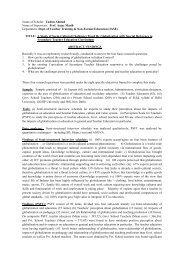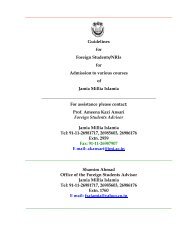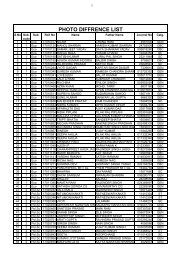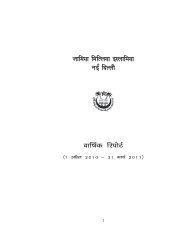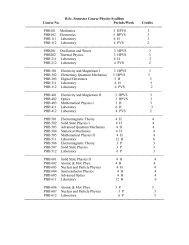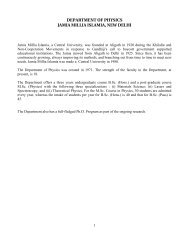Jauhar | September-November 2010 - Jamia Millia Islamia
Jauhar | September-November 2010 - Jamia Millia Islamia
Jauhar | September-November 2010 - Jamia Millia Islamia
Create successful ePaper yourself
Turn your PDF publications into a flip-book with our unique Google optimized e-Paper software.
Photos courtesy PRO, Aligarh Muslim University<br />
wards to prepare them for government jobs, not disobedience.<br />
At the peak of the Non-Cooperation Movement,<br />
on October 12, 1920, Gandhiji, accompanied by Khilafat<br />
leader Maulana Mohamed Ali, an alumnus of<br />
Mohammadan Anglo Oriental College, arrived in<br />
Aligarh to address the students. Their plea to students<br />
to boycott an institution funded by a repressive<br />
government was greeted with jeers. This episode was<br />
missed by a young 23-year-old lecturer, Zakir Husain,<br />
who had been a part of Mohammadan Anglo<br />
Oriental College for seven years, being a sterling performer<br />
in academics and held in high esteem by students<br />
and teachers for his intellectual acumen.<br />
Husain was in Delhi that day to get himself examined<br />
by Dr MA Ansari for an illness. When he<br />
reached Aligarh railway station on the evening of the<br />
12th, he was appalled at the derogatory talk about<br />
the two leaders. That catalysed his resolve to further<br />
the Non-Cooperation Movement in his<br />
institution.<br />
On October 13, students demanded that the college<br />
stop accepting government aid. They threatened<br />
that if their demands were not met by October 26,<br />
they would leave no stone unturned to convert the<br />
institution into a national institution themselves.<br />
The next two weeks were marked by apprehension<br />
Genesis of <strong>Jauhar</strong><br />
How the new <strong>Jamia</strong> newsletter<br />
got its name<br />
When we sat down to give a<br />
name to this new publication,<br />
we had to choose from among<br />
equally strong ‘contenders’. In particular,<br />
<strong>Jamia</strong> Nama was popular<br />
among the editorial board, as it<br />
was a direct and effective name.<br />
Giving it competition was the name<br />
<strong>Jauhar</strong>. It carried a mystery, and<br />
would incite readers to pick it up,<br />
said the aye sayers. But it carried wrong connotations<br />
too, and might confuse the readers, said the nay sayers.<br />
One reason that weighed in favour of <strong>Jauhar</strong> was an<br />
earlier publication, run by Dr Zakir Husain, by the same<br />
name, when <strong>Jamia</strong> had just begun. More importantly,<br />
‘<strong>Jauhar</strong>’ was the poetic name of <strong>Jamia</strong>’s founding father<br />
Maulana Mohamed Ali, who was not only a firebrand<br />
leader, but also a writer and a poet, and who had<br />
started two publications, Comrade and Hamdard. This<br />
University owes its genesis to him, and <strong>Jauhar</strong> is a<br />
tribute to him.<br />
and nervous excitement. While the authorities, to<br />
maintain order, sent telegrams to parents to take<br />
back their wards and offered attractive jobs to certain<br />
students to crush the movement, the students<br />
galvanised support in favour of a national institution.<br />
Zakir Husain visited Hakim Ajmal Khan,<br />
Dr Ansari and Mohamed Ali in Delhi and assured<br />
them that if a national institution was formed, there<br />
would be enough students willing to break away.<br />
Foundation<br />
<strong>Jamia</strong> was formally inaugurated at Aligarh College<br />
Mosque, with Hakim Ajmal Khan as its Chancellor<br />
and Maulana Mohamed Ali as Vice-Chancellor. It<br />
was largely funded by the Khilafat Committee and<br />
donations from individuals interested in an autonomous<br />
institution.<br />
Years later, remembering those heady days of<br />
October 1920, Dr Zakir Husain said, “Along with<br />
obedience and loyalty, abiding by the norm of this<br />
academic place of my own free will was no less than<br />
freedom to me. However, this very fountain of life<br />
invested me with the power to rise against its own<br />
system when I found it in conflict with my conscience.<br />
I was declared a rebel, expelled from here<br />
and spent about a quarter of a century in creating a<br />
new tent.”<br />
<strong>Jauhar</strong> | <strong>September</strong>-<strong>November</strong> <strong>2010</strong> |21


